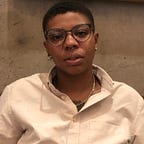Recalling Them
Hi, I’m Court, and I’m a nonbinary. A nonbinary? Hi, I’m Court and I’m them. I’m them? A non-binary them. Ugh.
Hi, I’m Court, fuck gender!
There we go.
I know gender is fallacious, unfounded, and exploitative, but I still feel constantly berated by the need to perform gender. Often, it’s my own internalized bias screaming at me. Add trauma-induced memory loss, and often, my understanding and thus memory of myself is merely an outline.
When I recall my younger self, I remember them.
In 2019, I made the plunge, first probing my queer comrades, and then on social media, and finally boldly to a few friends in my day-to-day life, “my pronouns are they and them.” At damn-near-thirty, I honestly felt so much shame. Who do I think I am changing my pronouns at this big age? Am I trans? Who is they?
As a relatively privileged queer vested in a liberatory, feminist praxis that prioritizes radical self-care, of course, I’m in therapy. In therapy, we spend a lot of time in the past. And, when I think about my childhood self, I am often overwhelmed with painting an image of myself in my mind that honors that child, the present, and the them in the untethered realm who hold me.
It’s been tumultuous returning to a therapy regimen. My therapist is excellent at her job, and I am often raw after our weekly sessions. So, by week two, as we settled into a stable therapy relationship, I pronounced to her, “I am them — not her, and I need to know what that means.” She quickly identified latent PTSD I’ve operationalized for survival, and we work to map all the roots for the unearthing process that comes next.
The reality is, I did not live my life as a girl. I was socialized as a girl, and now I want to be released from the grips of gender. I want to be released from the entire construct, not just the rigid system of binary classification. Be that as it may, even in my queerest spaces, the pressure to articulate a gendered existence is deafening.
So, I’m them. They are me. Little Court, they also are me.
But, that ‘they’ also embodies an ethos of us. Me and my ancestors.
I began to seriously grapple with my gender identity after I relocated to South Africa. The prominence of an indigenous language and the explicit use of the plurality in the Afrikan lexicon encouraged a personal journey to find the ‘them’; the them folks speak to when they greet me — San’bonani (literally translated, I see you all — used loosely as hello y’all, a salutation). And that spiritual journey parallelling an indescribable proliferation of gender-norming brought me to this current juncture where I am neither man nor woman.
And, little Court, they too, are them. They are the essence of my queer aspirations. They go to school with bows, balls, and frilly socks, and spiritedly lose them throughout the day. They play outside with cousins, dogs, and rocks. They are always eager to pick some of the greens, mold the pie crust, or crack pecans. They teach their older cousins elementary mathematics and imagine themselves as a bird when jumping from a tree. They are free. They’re not a girl because what are girls?
And, when I recall them, I recognize their robust laugh and unwavering commitment to knowing. Nevertheless, I am conscious of how gender was projected onto them and of their perceived deviance, constantly probing, always challenging. I think of them as a manifestation of my great-grandmother’s imagination, who undeniably inhibits the them I am now.
When I do the intense labor of recalling my childhood self, I call them, them. They deserve the recognition that decenters gender, even if I struggle to do so in my life now.
